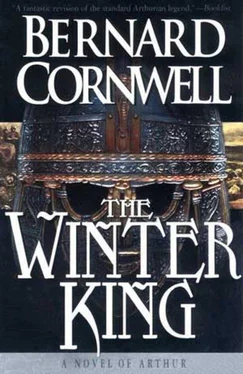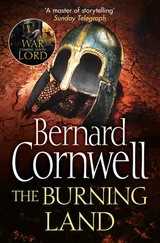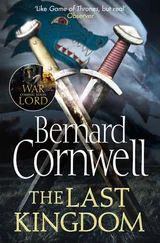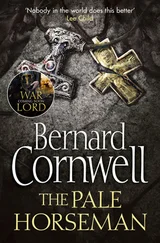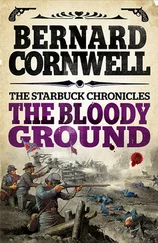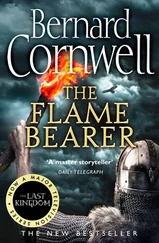I carried no weapons, unless a staff and a knife count as a warrior's accoutrements. I had wanted to carry both a sword and a spear, to look like a grown man, but Hywel had scoffed that a man was not made by wanting, but by doing. For my protection he gave me a bronze torque that displayed Merlin's horned God at its finials. No one, he said, would dare challenge Merlin. Yet even so, without a man's weapons, I felt useless. Why, I asked Nimue, was I there?
“Because you're my oath-friend, little one,” Nimue said. I was already taller than she, but she used the term affectionately. “And because you and I are chosen of Bel and if He chooses us, then we must choose each other.”
“Then why are the two of us going to Glevum?” I wanted to know.
“Because Merlin wants us there, of course.”
“Will he be there?” I asked eagerly. Merlin had been away so very long, and without him Ynys Wydryn was like a sky without its sun.
“No,” she said calmly, though how she knew Merlin's desire in this matter I did not know for Merlin was still far away and the summons for the High Council had been issued long after his departure.
“And what will we do when we reach Glevum?”
“We will know when we get there,” she said mysteriously and would explain no more. Glevum, once I had grown accustomed to the overpowering stench of night soil was marvellously strange. Other than some of the villas that had become farmsteads on Merlin's estates, this was my first time in a proper Roman place and I gawked at the sights like a new-born chick. The streets were paved with fitted stones, and though they had canted in the long years since the Romans' departure, King Tewdric's men had done their best to repair the damage by pulling up the weeds and sweeping away the soil so that the city's nine streets looked like stony watercourses in the dry season. It was hard to walk on them, and it made Nimue and me laugh to see horses trying to negotiate the treacherous stones. The buildings were as weird as the streets. We made our halls and houses out of wood, thatch, clay-cob and wattle, but these Roman buildings were all joined together and made of stone and strange narrow bricks, though over the years some of them had collapsed to leave ragged gaps in the long rows of low houses that were curiously roofed with baked clay tiles. The walled city guarded a crossing of the Severn and stood between two kingdoms and near to a third, and so it was a famous trading centre. Potters worked in the houses, goldsmiths stooped over their tables and calves bellowed in a slaughter yard behind the market place that was crowded with country folk selling butter, nuts, leather, smoked fish, honey, dyed cloth and newly sheared wool. Best of all, at least to my dazzled eyes, were King Tewdric's soldiers. They were Romans, Nimue told me, or at least they were Britons taught the Roman ways, and all kept their beards clipped short and were dressed alike in sturdy leather shoes and woollen hose beneath short leather skirts. The senior soldiers had bronze plates sewn on to the skirts and when they walked the armour plates would clank together like cow bells. Each man had a breastplate polished bright, a long russet cloak, and a leather helmet that was sewn at the crown into a ridge. Some of the helmets were plumed with dyed feathers. The soldiers carried short, broad-bladed swords, long spears with polished staffs and oblong shields of wood and leather that carried Tewdric's bull symbol. The shields were all the same size, the spears all of a length and the soldiers all marched in step, an extraordinary sight that made me laugh at first though later I became used to it.
At the centre of the town, where the four streets from the four gates met in a wide open square, there stood a vast and wondrous building. Even Nimue gaped at it, for surely no one living could make such a thing; so high, so white and so sharply cornered. Pillars held the roof high, and all along the triangular space between the roof's peak and the pillars' tops were fantastic pictures carved in white stone that showed marvelous men trampling enemies beneath their horses' hooves. The stone men carried sheaves of stone spears and wore stone helmets with soaring stone crests. Some of the pictures had dropped away or had split in the frosts, yet were still a miracle to me, though Nimue, after staring at them, spat to ward off the evil.
“Don't you like it?” I asked her resentfully.
“The Romans tried to be gods,” she said, 'which is why the Gods humbled them. The Council should not meet here."
Yet Glevum was where the High Council was summoned, and Nimue could not change it. Here, encompassed by Roman ramparts of earth and wood, the fate of Uther's kingdom was to be decided. The High King had already arrived by the time we reached the town. He was lodging in another high building that faced the pillared hall across the square. He showed neither surprise nor displeasure that Nimue had come, perhaps because he thought she was merely a part of Morgan's retinue, and he gave us all a single room in the back of the house where the kitchens smoked and the slaves squabbled. The High King's soldiers looked drab beside Tewdric's shining men. Our soldiers wore their hair long and their beards wild, they had patched and frayed cloaks of different colours and carried long, heavy swords, rough-shafted spears and round shields on which Uther's dragon symbol looked crude beside Tewdric's carefully painted bulls.
For the first two days there were celebrations. Champions of the two kingdoms fought mock fights outside the walls, though when Owain, Uther's champion, went into the arena King Tewdric was forced to pit two of his best men against him. Dumnonia's famous hero was reputed to be invincible, and he looked it as he stood with the summer sun glinting off his long sword. He was a huge man with tattooed arms, a matted bare chest and a bristling beard decorated with warrior rings forged from the weapons of defeated enemies. His fight against Tewdric's two champions was supposed to be a mock battle, but the mockery was hard to see as the two heroes of Gwent took their turns to attack him. The three men fought as though they were filled with hate and exchanged sword blows that must have rung north into distant Powys, and after a few minutes their sweat was mixed with blood, their blunt swords' edges were dented and all three men were limping, but Owain was still getting the best of the bout. Despite his size he was fast with a sword, and his blows carried crushing weight. The crowd, which had gathered from all the country thereabouts and was thus drawn from both Uther's and Tewdric's kingdoms, was shouting like wild beasts to urge their men on to massacre, and Tewdric, seeing the passion, threw down his staff to end the fight. “We are friends, remember,” he told the three men, and Uther, seated one step higher than Tewdric as befitted the High King, nodded agreement.
Uther looked gross and ill; his body was swollen with fluid, his face was yellowing and slack, his breathing laboured. He had been carried to the fighting field in a litter and was swathed on his throne in a heavy cloak that hid his jewelled belt and bright torque. King Tewdric dressed as a Roman, indeed his grandfather had been a real Roman which must have explained his foreign-sounding name. The King wore his hair clipped very short, had no beard, and was swathed in a white toga folded intricately at one shoulder. He was tall, thin and graceful in his movements, and though he was still a young man, the sad, wise look of his face made him seem much older. His Queen, Enid, wore her hair in a weird plaited spiral that was piled so precariously on top of her skull that she was forced to move with the angular awkwardness of a new-born colt. Her face was caked with a white paste that fixed her with a vacant expression of perplexed boredom. Her son Meurig, the Edling of Gwent, was a fidgety child of ten who sat at his mother's feet and was struck by his father every time he picked his nose. After the fighting the harpists and bards had their contest. Cynyr, the Bard of Gwent, sang the great tale of Uther's victory over the Saxons at Caer Idem. Later I realized that Tewdric must have ordered it as a tribute to the High King, and certainly the performance pleased Uther who smiled as the verses rolled by and nodded whenever a particular warrior was praised. Cynyr declaimed the victory in a ringing voice, and when he came to the lines which told how Owain had slaughtered Saxons by the thousand, he turned towards the tired, battered fighter and one of Tewdric's champions, who only an hour before had been trying to beat the big man down, stood and raised Owain's sword arm. The crowd roared, then they laughed as Cynyr adopted a woman's voice to describe the Saxons pleading for mercy. He began to run about the field in little, panicked steps, crouching as though hiding, and the crowd loved it. I loved it too, for you could almost see the hated Saxons cowering in terror and smell the stench of their death blood and hear the wings of the ravens coming to gorge on their flesh, and then Cynyr straightened to his full height and let his cloak drop away so that his blue-painted body was naked and he sang the tribute song of the Gods who had watched their champion, High King Uther of Dumnonia, the Pendragon of Britain, beat down the kings and chiefs and champions of the foe. Then, naked still, the hard prostrated himself before Uther's throne.
Читать дальше
